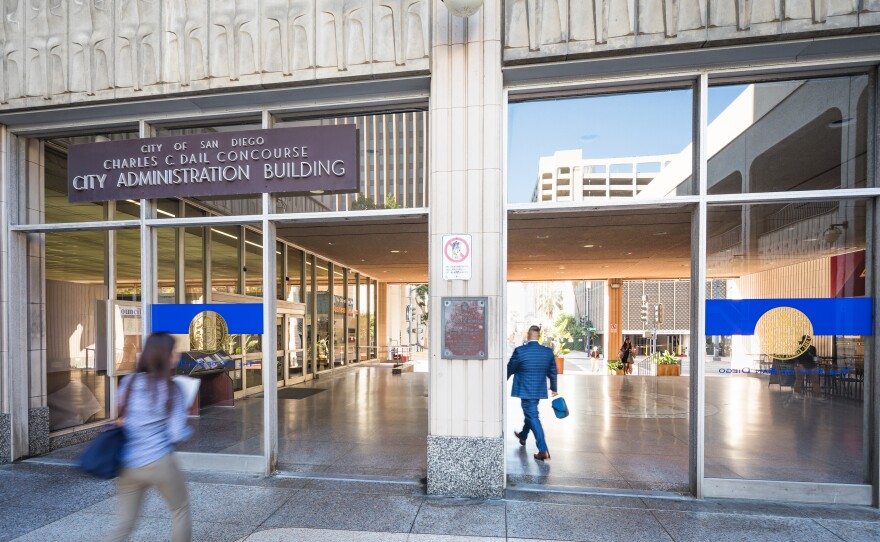The San Diego City Council Tuesday will make a final decision on Mayor Todd Gloria's proposed budget for fiscal year 2026, which will likely usher in large service cuts.
Gloria's proposed budget met a chilly reception last month when it was presented to the council.
In his revised budget, Gloria restored some funding to the San Diego Police Department, San Diego Fire-Rescue and the San Diego Humane Society, but not to parks and libraries.
"We have never been resourced the way a city of our size should be," Gloria said. "But we are required by law to have a balanced budget."
He reminded the council that any restorations to services will come by finding new revenue sources, or cutting from elsewhere.
"The projections for the major revenues the city relies on to pay for our operations have not improved since the draft budget's release last month, but we were able to make small changes in response to what we heard from San Diegans about their priorities through the budget review hearings," Gloria said.
"The cuts we were forced to make to balance the budget are not what any of us want, but we've worked within our means to create a responsible, strategic and balanced spending plan that prioritizes keeping San Diegans safe, fixing our roads and critical infrastructure, and reducing homelessness with a range of interventions — including building more housing."
That didn't hold water for several members of the council.
"It's a revise that's not a revise," said Councilman Sean Elo- Rivera, who said the mayor's office failed by not bringing forward a proposal to charge for parking for non-residents at places such as Balboa Park and the beaches.
Elo-Rivera spoke in May at a rally at Jeremy Henwood Memorial Park to remind those charged with crafting the budget what it meant to citizens.
"Cutting library hours, shrinking youth programs and defunding recreation centers might look like math on a spreadsheet, but in real life, it means fewer safe spaces for kids, fewer resources for families and fewer opportunities for our neighborhoods," he said. "San Diego deserves better — and we must say no to across-the-board cuts that fail to recognize the vulnerability in our communities."
Councilman Henry Foster III shared some of his colleague's thoughts. In a testy exchange with Gloria, Foster asked repeatedly if the mayor agreed that keeping libraries and recreation centers open played a role in public safety.
Gloria agreed in principle, but reminded the council what happened the last time the city was faced with such a large deficit — when Gloria was on the council. Library hours were cut, but some fire stations were "browned out," leading to slower response times, and — Gloria said — even some deaths.
"I don't want you to have the same regrets I had when I served," the mayor said.
The largest adjustment in Gloria's revised budget was to restore $773,529 of a $1.7 million reduction to consolidate police patrols in the northern part of the city between the Northern and Northeastern divisions. Gloria's new revisions will have patrol officers continue to be based at Northwestern Division, but with staffing changes that have them reporting to a lieutenant instead of a captain. The proposed budget also restores two vice detective positions that the draft budget had removed.
Councilwoman Marni von Wilpert said investing in public safety was a high priority, but said she would look into ways to restore full access to the city's lakes, such as Hodges, Murray and Miramar Reservoir. She said eliminating superfluous contracts — perhaps with homeless-serving organizations — could find the funding needed for such a move.
The revisions also restore some, but not all, of the city's contract with San Diego Humane Society for animal services. Dr. Gary Weitzman, president and CEO of the humane society, said that still leaves a $1 million gap to maintain services.
According to the cuts, all of the city's 37 libraries will be closed on Sundays and Mondays, starting as early as July 1.
In December, Gloria announced that San Diego was facing a $258 million budget deficit in the next fiscal year "amid declining growth in property, hotel room and sales taxes," a statement from his office read.
That deficit then continued to grow because of a decrease in sales-tax revenue, lower-than-anticipated franchise fees from San Diego Gas & Electric and an increase in employee pension costs.
In November's election, voters declined the San Diego Transaction and Use Tax, which would have increased the tax on transactions in the city by 1%, bringing the total sales tax to 8.75%. The current rate of 7.75% leaves the city tied for the fourth-lowest of the state's 482 municipalities and lower than nine of the county's 18 cities, according to the California Department of Tax and Fee Administration.
The additional $400 million that would have been raised by the proposal was a key emphasis of the measure's proponents, but the other side of that issue — the cuts that would need to be made if it were not passed — was less frequently referenced.






